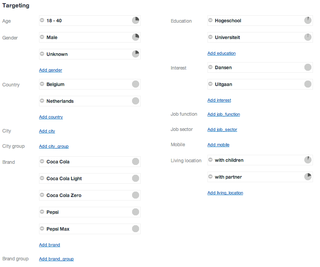Claria Corporation was a software company based in Redwood City, California that invented “Behavioral Marketing”, a new form of online advertising. It was founded in 1998 by Denis Coleman, Stanford MBA Sasha Zorovic, and engineer Mark Pennell, based on work Zorovic had done at Stanford. In March 1999 Jeff McFadden was hired as CEO and Zorovic was effectively forced out.
Rogers Hi-Speed Internet is a broadband Internet service provider in Canada, owned by Rogers Communications. Rogers previously operated under the brand names Rogers@Home, Rogers Yahoo! Hi-Speed Internet, WAVE, and Road Runner in Newfoundland. It is currently the second largest Internet provider in Canada, after Bell Internet by customer count.
Deep packet inspection (DPI) is a type of data processing that inspects in detail the data being sent over a computer network, and may take actions such as alerting, blocking, re-routing, or logging it accordingly. Deep packet inspection is often used for baselining application behavior, analyzing network usage, troubleshooting network performance, ensuring that data is in the correct format, checking for malicious code, eavesdropping, and internet censorship, among other purposes. There are multiple headers for IP packets; network equipment only needs to use the first of these for normal operation, but use of the second header is normally considered to be shallow packet inspection despite this definition.

Direct marketing is a form of communicating an offer, where organizations communicate directly to a pre-selected customer and supply a method for a direct response. Among practitioners, it is also known as direct response marketing. In contrast to direct marketing, advertising is more of a mass-message nature.

Google Ads is an online advertising platform developed by Google, where advertisers bid to display brief advertisements, service offerings, product listings, and videos to web users. It can place ads in the results of search engines like Google Search, mobile apps, videos, and on non-search websites. Services are offered under a pay-per-click (PPC) pricing model.
Yahoo! Native is a native "Pay per click" Internet advertising service provided by Yahoo.
Internet privacy involves the right or mandate of personal privacy concerning the storage, re-purposing, provision to third parties, and display of information pertaining to oneself via the Internet. Internet privacy is a subset of data privacy. Privacy concerns have been articulated from the beginnings of large-scale computer sharing and especially relate to mass surveillance.
Online advertising, also known as online marketing, Internet advertising, digital advertising or web advertising, is a form of marketing and advertising that uses the Internet to promote products and services to audiences and platform users. Online advertising includes email marketing, search engine marketing (SEM), social media marketing, many types of display advertising, and mobile advertising. Advertisements are increasingly being delivered via automated software systems operating across multiple websites, media services and platforms, known as programmatic advertising.
WideOpenWest is the eighth largest cable operator in the United States with their network passing 1.9 million homes and businesses. The company offers landline telephone, cable television, and broadband Internet services. As of November 3, 2022, WOW! has about 538,100 subscribers.

Embarq Corporation was the largest independent local exchange carrier in the United States, serving customers in 18 states and providing local, long-distance, high-speed data and wireless services to residential and business customers. It had been formerly the local telephone division (LTD) of Sprint Nextel until 2006, when it was spun off as an independent company. Embarq produced more than $6 billion in revenues annually, and had approximately 18,000 employees. It was based in Overland Park, Kansas.

Breezeline is the trade name for the United States operations of Cogeco Communications, constituting the 8th largest cable operator in the United States, based on the number of television service customers served. The company currently provides TV, Internet and phone services using a combined coaxial cable & fiber-to-the-premises (FTTP) network. Breezeline currently has approximately 707,000 broadband customers located in twelve states: New Hampshire, Maine, Connecticut, New York, Pennsylvania, Delaware, Maryland, Ohio, West Virginia, Virginia, South Carolina, and Florida. The company is headquartered in Quincy, Massachusetts.

In geomarketing and internet marketing, geotargeting is the method of delivering different content to visitors based on their geolocation. This includes country, region/state, city, metro code/zip code, organization, IP address, ISP, or other criteria. A common usage of geotargeting is found in online advertising, as well as internet television with sites such as iPlayer and Hulu. In these circumstances, content is often restricted to users geolocated in specific countries; this approach serves as a means of implementing digital rights management. Use of proxy servers and virtual private networks may give a false location.
Zedo is a US and India-based advertising technology company that provides several online advertising products and services to Internet publishers, advertisers, and agencies. The company was founded in 1999 by Roy de Souza.
Location-based advertising (LBA) is a form of advertising that integrates mobile advertising with location-based services. The technology is used to pinpoint consumers location and provide location-specific advertisements on their mobile devices.

Targeted advertising is a form of advertising, including online advertising, that is directed towards an audience with certain traits, based on the product or person the advertiser is promoting.
Behavioral retargeting is a form of online targeted advertising by which online advertising is targeted to consumers based on their previous internet behaviour. Retargeting tags online users by including a pixel within the target webpage or email, which sets a cookie in the user's browser. Once the cookie is set, the advertiser is able to show ads to that user elsewhere on the internet via an ad exchange.
Phorm, formerly known as 121Media, was a digital technology company known for its contextual advertising software. Phorm was incorporated in Delaware, United States, but relocated to Singapore as Phorm Corporation (Singapore) Ltd in 2012. Founded in 2002, the company originally distributed programs that were considered spyware, from which they made millions of dollars in revenue. It stopped distributing those programs after complaints from groups in the United States and Canada, and announced it was talking with several United Kingdom Internet service providers (ISPs) to deliver targeted advertising based on the websites that users visited. Phorm partnered with ISPs Oi, Telefonica in Brazil, Romtelecom in Romania, and TTNet in Turkey. In June 2012, Phorm made an unsuccessful attempt to raise £20 million for a 20% stake in its Chinese subsidiary.

The Network Advertising Initiative is an industry trade group founded in 2000 that develops self-regulatory standards for online advertising. Advertising networks created the organization in response to concerns from the Federal Trade Commission and consumer groups that online advertising — particularly targeted or behavioral advertising — harmed user privacy. The NAI seeks to provide self-regulatory guidelines for participating networks and opt-out technologies for consumers in order to maintain the value of online advertising while protecting consumer privacy. Membership in the NAI has fluctuated greatly over time, and both the organization and its self-regulatory system have been criticized for being ineffective in promoting privacy.
AdChoices is a self-regulatory program for online interest-based advertising that exists in the United States, Canada and across Europe. The program calls for advertising companies to establish and enforce responsible privacy practices for interest-based advertising, aimed to give consumers enhanced transparency and control. Companies adhere to a set of principles that are enforced by accountability programs.
On 28 March 2017, the United States House of Representatives passed a resolution of disapproval to overturn the Broadband Consumer Privacy Proposal privacy law by the Federal Communications Commission (FCC) and was expected to be approved by United States' President Donald Trump. It was passed with 215 Republican votes against 205 votes of disapproval.






